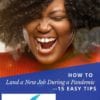
There is no “rule” that a résumé should be only one page. In fact, there are many instances when a multi-page résumé is not only appropriate, it’s expected.
Length is not the only consideration for a résumé’s effectiveness. Yet, the one-page résumé myth persists. Jobseekers are being misled that recruiters, hiring managers, and HR professionals won’t read a résumé that is longer than one page. That’s simply not true.
While recent research shows that a résumé will be read for only seconds when it is first screened, the first review is only to determine if it is a match for the position. If the jobseeker is considered a serious candidate, the résumé will be read again.
Jobseekers who believe an HR professional won’t read a two-page résumé should stop and consider the résumé screening process. The résumé screener’s boss is asking him or her to come up with four or five people to bring in for an interview. If a candidate with 5-10 years of experience tries to condense that to fit an artificial one-page limitation, you’re asking that HR person to make a decision about you, based on what amounts to a few paragraphs.
Given a choice between a well-written two-page résumé or a cluttered one-page résumé which omits notable accomplishments in the interest of saving space, the HR professional is likely to choose the longer résumé. Here in Australia, our résumés are typically three to four pages of powerfully written, relevant content.
If you submit a two- to four-page résumé and the person reading it decides you’re not a match for the job, he or she will stop reading. But if you do seem to fit the job requirements, that person will want to know even more about you. A well-organized multi-page résumé can actually make it easier for the screener to do his or her job by allowing him or her to easily determine if you’re a good match for the position.
So why does the one-page myth persist? Some recruiters are vocal about their desire for a one-page résumé. However, not all recruiters share this preference. There are certain recruiters who say they will only read one-page résumés. However, recruiters are responsible for placing fewer than 25% of candidates in new jobs, and not all recruiters subscribe to the one-page limit. If a particular recruiter requests a shorter résumé, you can always provide a one-page version to him or her.
When hiring managers and HR professionals are surveyed about résumé length, the majority express a preference for résumés that are one page OR two pages — the general consensus is “as long as needed to convey the applicant’s qualifications.”
College professors also share some of the blame for perpetuating the one-page résumé myth. Some professors — who have no connection to the employment world — believe “their way” is the right way to do things. They provide a template to their students and require advisees to use that format, even if the person is a non-traditional student who has an extensive work history or career path that sets them apart from other job candidates with similar educational backgrounds.
It would be unusual for most 21-year-old students to need two pages to describe their education and work history, but it’s not unrealistic to expect that an accomplished graduate might have internships, projects, activities, and honours that would make it necessary to exceed the one-page length.
If you doubt the “Do as I say, not as I do” approach, ask any professor to see his or her résumé. Chances are, it will be at least two pages long to include consulting work and works published, in addition to classroom teaching experience. But professors call their résumés “curriculum vitaes,” so they don’t have to follow their own one-page résumé limit.
Résumés submitted online are also less likely to be affected by the one-page résumé myth. That’s because the one-page format is unique to the printed page. Résumés uploaded to company websites aren’t affected by page limits. Approximately 30 percent of résumés are only stored electronically. They’re never printed out, so the screener never knows it’s more than a one-page document.
Length does matter. Your résumé should only be as long as it needs to be to tell the reader exactly what he or she needs to know to call you in for an interview … and not one word more.
Here are some guidelines for deciding résumé length:
- If your résumé spills over onto the next page for only a few lines, it’s worth editing the text or adjusting the font, margins, and/or line spacing to fill the pages.
- Don’t bury key information on the second, third or fourth pages. If the first page doesn’t hook the reader, he or she isn’t even going to make it to the second page. Try adding a Career Highlights section on the first page to compel the reader to read on.
- Don’t be afraid to go beyond two pages if your experience warrants it. Senior executives often require three- or four-page résumés, as do computer programmers and many professionals (physicians, lawyers, professors).
- Make sure that everything you include — regardless of length — is relevant to your job target and what the hiring manager will want to know about you!

